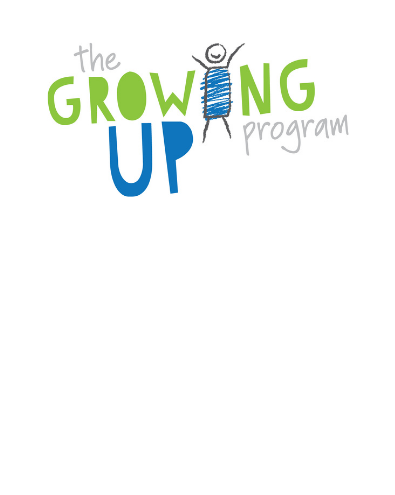Supporting Children to Grow Up
For many of us discussions around puberty and how babies are made were not openly spoken about or encouraged. Times have changed and these discussions are now encouraged and promoted within schools to contribute to positive health and wellbeing of young people.
Often, parents/carers ask us how they can support their children while growing up, so we have created the following tips to help you.
Supporting Children Kindergarten - Year 2 children
Children may begin to become more curious about their bodies. Some may begin touching their own private parts.
- React calmly; do not make them feel guilty or ashamed, it is important to keep lines of communication open. Exploratory touching of private parts and self-soothing is usually normal at this age.
- Children need to be taught to only touch their private parts when in a private place. It is also important for them to understand that it is not ok for them to touch the private parts of other people, or for other people to be touching their private parts without a good reason.
- Look at books together to learn about similarities and differences between bodies.
- Teach your child about being private and use the term ‘private parts’ rather than ‘rude bits’, as we want children to be able to feel comfortable talking to trusted adults about these body parts.
- It is important for children to understand the correct names for private parts (such as penis, testicles, vulva and vagina), as this helps them to talk about bodies in a respectful way, but most importantly enables them to be understood if they ever need to ask for help.
Children may begin to become shy about their bodies.
- Teach them to wash themselves and care for their own private parts.
- Always ask their permission before helping them in the bath or shower.
- Give them more privacy in the bathroom as they grow older.
- Teach children the difference between public and private places both in the home and in the community.
Children may develop a greater interest in pregnancy or birth.
- Answer questions simply and honestly – you do not have to provide all the information at once.
- Answering these questions does not have to be ‘the talk’, have conversations over time so that you are gradually building their knowledge.
Puberty changes
- Some children begin puberty as young as 8 years old. (Refer to supporting 3-4 children below)
Supporting Children Year 3 - 4 children
Are you ready for Puberty?
- Puberty can begin from around 8 years old. You may notice breast budding, growth spurt, underarm hair, and pubic hair.
- Talk with your child about the changes they can expect to occur.
- Some children may not be interested or may not want these changes to happen. If your child is particularly worried or anxious about puberty, you can talk to your GP or book an appointment with a doctor at Family Planning Tasmania.
- If you believe; your child may have started puberty and is waiting for periods to start, have a purse or pencil case containing pads or period underwear and clean underpants in their school and overnight bags.
- Read books about puberty.
Interest and curiosity about pregnancy, babies and relationships
- Answer questions simply and honestly.
- Children are learning about sexuality from an early age. Help your child choose TV shows, movies, music and computer games that are appropriate for their age.
- Discuss your family beliefs and values and encourage your child to think about their own and those of others.
Children are likely to want to become more private
- Respect requests from your child for more privacy (e.g. allow for private bathroom time).
Friends and peers can become more important, ‘ganging up’ or ‘gossiping’ can become more common
- Talk about how things make you feel and how things may make others feel. Open lines of communication can help your child to feel they can talk to you about different situations.
- Give your child the opportunity to sort out friendship troubles by themselves, but be there to help them to make healthy respectful decisions.
Supporting Children Year 5 - 6 children
Puberty
- Talk with your child about the changes that will occur; as they grow older. It is always helpful for them to be aware that you once went through puberty as well.
- Open lines of communication can help them to feel they can talk to you about different situations.
- Puberty can begin from around 8 year’s old. Let them know they may notice changes such as breast budding, a growth spurt, underarm hair, and pubic hair.
- If you believe, your child may have started puberty and it waiting for periods to start, have a purse or pencil case containing pads and clean underpants in their school and overnight bags.
- If your child’s voice begins to change, do not draw attention to it or make fun of it as it can have negative effects on their self-esteem. They may think it is funny and joke about it, but this allows it to be their choice.
- Some children may not be interested or may not want these changes to happen. If your young person is particularly worried or anxious about puberty, you can talk to your GP or book an appointment with a doctor at Family Planning Tasmania.
- Read books about puberty.
Start of adolescence and beginning to explore relationships and sexual identity
- We learn about sexuality from an early age. Allow your child to make their own choices; however, these choices need to be guided when it comes to age-appropriateness (e.g., online platforms, TV shows, movies, and computer games).
- Discuss your family beliefs and values and encourage your child to think about their own and those of others
- Get to know your child’s friends and their parents/carers.
- Talk to your child about the qualities they like in other people.
- Accept and value that everyone is different.
Greater interest in mobile phones and social media
- It is important for children to be taught online safety early on so that they develop safe online habits or practices and understand the importance of speaking to a trusted adult if they ever feel uncomfortable or unsafe online.
- If you decide to give your young person a mobile phone, or they are using social media, set rules in a positive way. Have a discussion with your child about the rules so that they understand and do not just feel a lack of trust.
- To join many social media platforms, users must be 13 years old. You could create a family profile and use it together to teach them how to be safe and respectful online.
- Teach your child not to share anything private, nor to request anything private from others: phone numbers, addresses, passwords, naked photos etc.
- Encourage your child to be open with you without fear of punishment, as they are less likely to reach out for help if they believe they will get in trouble.
- Be aware that many gaming platforms allow communication between players. This is an important place for supervision as well.
More information
Further information
If you have any concerns about the child’s safety or the safety of others please contact the Police on 000 and/or Strong Families Safe Kids Advice and Referral Line on 1800 000 123
Talk Soon, Talk Often is a fantastic resource for families and can be accessed here
Related topics
We're here for you at every stage of life
We have clinics in Burnie, Launceston, and Hobart. Interpreter services available.


